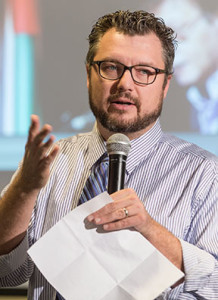During my recent commutes to work, I have been enjoying the audio of Jane McGonigal’s 2011 book Reality is Broken: Why Games Make Us Better and How They Can Change the World . This is one of those titles that I have always meant to read, and I am just now getting to it. McGonigal’s general thesis is that the compelling aspects of game-play (especially online gaming) can be applied to many areas of life (social problems, routine tasks, etc) in an effort to make life more engaging.
While McGonigal has much to offer the library community, her discussion of collaboration and coordination caught my eye. I have written about these topics in the past (see Library Management and Entropy: The Information as Management Text and Your “Library” Doesn’t Participate in Social Media, but Your People Do).
McGonigal notes that online games are particularly good at collaboration. She outlines three components of successful collaboration:
–Cooperation. Players must agree to work together and partner together.
–Coordination. Players much align efforts to work together.
–Co-creation. Players cooperate and coordinate as they produce something new (whether it is a creation in an online world or a shared experience).
She emphasizes the third in this list. True collaboration produces something new. It is a creative process.
McGonigal notes that elite gamers build high-level collaboration skills. She calls them “extraordinary collaborators.” These extreme collaborators built their skills through years of online gameplay. They have the following attributes: First, they are extremely outgoing in an online environment. Even if they are introverted in the F2F world, they must be extremely outgoing in the networked world. Second, they not only easily connect with others but they also have a good sense about whom to connect with. They are not connection spammers. They recognize when to connect and when NOT to connect. Third, they are very good at working in chaotic environments where the situation is emergent or outcomes are impossible to predict. In massive game environments, it is impossible for one individual to grasp the entire world around them. Extraordinary collaborators can engage their segment of a larger, game world while remaining calm and making decisions.
As I listened to this, I was struck by its applicability to the work of librarians. Her description of successful collaboration applies to much of what we do (not just game playing). Cooperation, coordination, and co-creation can be applied to how our staff members work together, programming we may offer our communities, and the “big-picture” impact our services have. The creative, collaborative process that focuses on making things, ideas, or experiences is increasingly (has always been?) at the heart of librarianship.
McGonigal’s description of gamers as “extraordinary collaborators” reads as if it was written for librarians. She is talking about online gamers, but this description has broader implications. All areas of librarianship require some degree of collaboration and coordination
but we are in a period of time where “extraordinary collaboration” brings great benefits. Whether this is an instruction librarian partnering with many faculty members, a programming librarian working with community organizations, a library fundraiser reaching out to donors, or a library administrator strategically building partnerships, librarians no longer have the luxury of single collaborations at a time. We must connect widely, outline shared goals, and create a plan to reach those goals. McGonigal describes the events in massive online games as “emergent” where small interactions result in larger, complex systems (see Steven Johnson’s Emergence). Like gamers, librarians must learn to manage the chaos of a collaborative enterprise. For us, success is emergent.
————
 Troy A. Swanson is Department Chair and Teaching & Learning Librarian at Moraine Valley Community College. He is the co-editor of the upcoming book from ACRL, Not Just Where to Click: Teaching Students How to Think About Information. You can follow him on Twitter at@t_swanson.
Troy A. Swanson is Department Chair and Teaching & Learning Librarian at Moraine Valley Community College. He is the co-editor of the upcoming book from ACRL, Not Just Where to Click: Teaching Students How to Think About Information. You can follow him on Twitter at@t_swanson.
